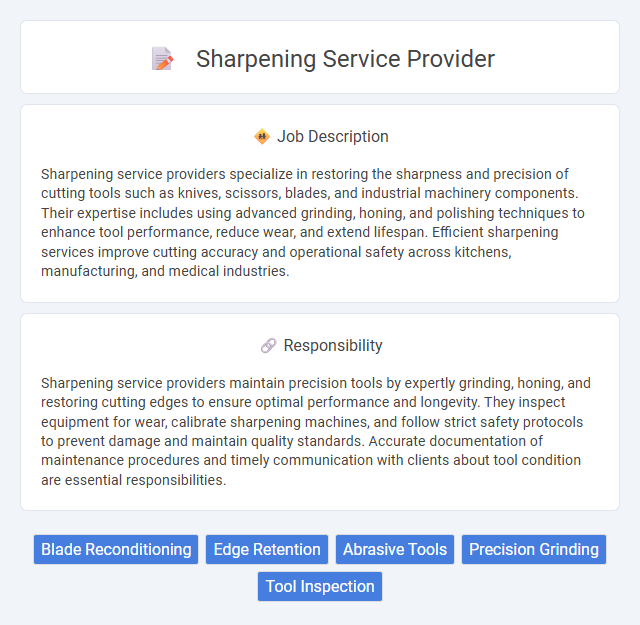
Sharpening service providers specialize in restoring the sharpness and precision of cutting tools such as knives, scissors, blades, and industrial machinery components. Their expertise includes using advanced grinding, honing, and polishing techniques to enhance tool performance, reduce wear, and extend lifespan. Efficient sharpening services improve cutting accuracy and operational safety across kitchens, manufacturing, and medical industries.
Individuals with strong attention to detail and good hand-eye coordination are likely to be well-suited for a sharpening service provider job. People who can maintain focus for extended periods and enjoy working with precision tools may find the role fitting. Those with physical stamina and an interest in mechanical processes probably have a higher chance of thriving in this position.
Qualification
A sharpening service provider must possess expertise in handling various tools, such as knives, scissors, and industrial blades, ensuring precision and safety. Proficiency with sharpening equipment, including grinding machines and honing stones, is essential for delivering high-quality results. Strong attention to detail and knowledge of blade materials and angles contribute to optimal sharpening performance.
Responsibility
Sharpening service providers maintain precision tools by expertly grinding, honing, and restoring cutting edges to ensure optimal performance and longevity. They inspect equipment for wear, calibrate sharpening machines, and follow strict safety protocols to prevent damage and maintain quality standards. Accurate documentation of maintenance procedures and timely communication with clients about tool condition are essential responsibilities.
Benefit
Hiring a sharpening service provider likely enhances the precision and longevity of tools, increasing overall efficiency in various tasks. Professional sharpening can reduce downtime caused by dull equipment, potentially saving both time and operational costs. Regular use of sharpening services may also promote safety by maintaining tools at optimal performance levels.
Challenge
Sharpening service providers likely face challenges related to maintaining consistency in blade precision while working with diverse materials and tools. There is a probability that managing tight deadlines and high volume orders may lead to increased pressure and potential for errors. Adapting to evolving sharpening technologies and customer expectations could also present ongoing difficulties.
Career Advancement
Sharpening service providers enhance the performance and longevity of cutting tools, such as knives, blades, and industrial instruments, by restoring precise edges. Mastery in sharpening techniques and knowledge of various materials enable professionals to advance to supervisory roles or specialize in high-demand sectors like manufacturing and healthcare. Developing skills in equipment maintenance, quality control, and customer service can lead to career growth opportunities in technical consulting or business ownership.
Key Terms
Blade Reconditioning
Blade reconditioning is a critical service within sharpening service provider roles, focusing on restoring cutting tools to optimal performance and extending their lifespan. This process involves precision grinding, honing, and polishing techniques to remove wear, chips, and burrs from blades used in industries such as manufacturing, woodworking, and metalworking. Effective blade reconditioning enhances cutting accuracy, reduces downtime, and improves overall operational efficiency for businesses relying on sharp, well-maintained tools.
Edge Retention
Sharpening service providers specialize in enhancing blade performance by focusing on maximizing edge retention, which ensures tools maintain sharpness longer and reduce the need for frequent resharpening. Utilizing advanced honing techniques and precision grinding, these professionals improve cutting efficiency and durability across various blades, including knives, industrial cutters, and surgical instruments. Effective edge retention directly impacts overall tool lifespan and operational productivity, making expert sharpening services essential in industries reliant on precision cutting.
Abrasive Tools
A sharpening service provider specializing in abrasive tools enhances the cutting performance and durability of blades, grinding wheels, and other cutting instruments. Utilizing precision grinding machines and advanced abrasive materials, these professionals restore tool edges to optimal sharpness for industrial, woodworking, and metalworking applications. Regular maintenance through expert sharpening extends tool lifespan, reduces operational downtime, and improves overall productivity in manufacturing environments.
Precision Grinding
Precision grinding specialists enhance metal components by achieving exact dimensions and smooth surface finishes. These sharpening service providers use advanced CNC machines and specialized grinding wheels to maintain blade sharpness and tool efficiency. High-quality precision grinding extends tool lifespan, reduces material waste, and ensures optimal performance in manufacturing processes.
Tool Inspection
Tool inspection is a critical component of a sharpening service provider's job, ensuring all cutting instruments meet precise specifications before and after sharpening. Using advanced measuring devices like micrometers and optical comparators, technicians assess blade edges for wear, damage, and alignment to guarantee optimal performance. Accurate tool inspection minimizes downtime and extends the lifespan of industrial tools, directly impacting manufacturing quality and efficiency.
 kuljobs.com
kuljobs.com